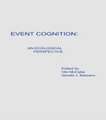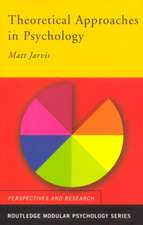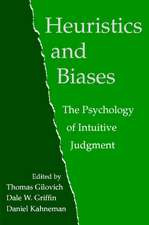Ecological Psychology in Context: James Gibson, Roger Barker, and the Legacy of William James's Radical Empiricism: Resources for Ecological Psychology Series
Autor Harry Heften Limba Engleză Paperback – 25 mar 2005
Ecological Psychology in Context:
*traces the primary lineage of Gibson's ecological approach to William James's philosophy of radical empiricism;
*illuminates how the work of James's student and Gibson's mentor, E.B. Holt, served as a catalyst for the development of Gibson's framework and as a bridge to James's work;
*reveals how ecological psychology reciprocally can advance Jamesian studies by resolving some of the theoretical difficulties that kept James from fully realizing a realist philosophy;
*broadens the scope of Gibson's framework by proposing a synthesis between it and the ecological program of Roger Barker, who discovered complex systems operating at the level of collective, social processes;
*demonstrates ways in which the psychological domain can be extended to properties of the environment rendering its features meaningful, publicly accessible, and distributed across person-environment processes; and
*shows how Gibson's work points the way toward overcoming the gap between experimental psychology and the humanities.
Intended for scholars and students in the areas of ecological and environmental psychology, theoretical and historical psychology, cognitive science, developmental psychology, anthropology, and philosophy.
| Toate formatele și edițiile | Preț | Express |
|---|---|---|
| Paperback (1) | 507.92 lei 6-8 săpt. | |
| Taylor & Francis – 25 mar 2005 | 507.92 lei 6-8 săpt. | |
| Hardback (1) | 1014.47 lei 6-8 săpt. | |
| Taylor & Francis – iul 2001 | 1014.47 lei 6-8 săpt. |
Din seria Resources for Ecological Psychology Series
-
 Preț: 373.49 lei
Preț: 373.49 lei -
 Preț: 293.25 lei
Preț: 293.25 lei - 8%
 Preț: 551.17 lei
Preț: 551.17 lei -
 Preț: 406.21 lei
Preț: 406.21 lei -
 Preț: 339.79 lei
Preț: 339.79 lei -
 Preț: 355.87 lei
Preț: 355.87 lei -
 Preț: 359.90 lei
Preț: 359.90 lei - 15%
 Preț: 470.05 lei
Preț: 470.05 lei -
 Preț: 357.16 lei
Preț: 357.16 lei -
 Preț: 496.81 lei
Preț: 496.81 lei -
 Preț: 340.85 lei
Preț: 340.85 lei -
 Preț: 355.58 lei
Preț: 355.58 lei - 5%
 Preț: 1168.92 lei
Preț: 1168.92 lei - 15%
 Preț: 677.30 lei
Preț: 677.30 lei - 15%
 Preț: 448.78 lei
Preț: 448.78 lei -
 Preț: 449.41 lei
Preț: 449.41 lei -
 Preț: 449.41 lei
Preț: 449.41 lei
Preț: 507.92 lei
Preț vechi: 597.54 lei
-15% Nou
Puncte Express: 762
Preț estimativ în valută:
97.19€ • 102.02$ • 80.67£
97.19€ • 102.02$ • 80.67£
Carte tipărită la comandă
Livrare economică 10-24 aprilie
Preluare comenzi: 021 569.72.76
Specificații
ISBN-13: 9780805856927
ISBN-10: 0805856927
Pagini: 472
Dimensiuni: 152 x 229 x 25 mm
Greutate: 0.66 kg
Ediția:1
Editura: Taylor & Francis
Colecția Psychology Press
Seria Resources for Ecological Psychology Series
Locul publicării:Oxford, United Kingdom
ISBN-10: 0805856927
Pagini: 472
Dimensiuni: 152 x 229 x 25 mm
Greutate: 0.66 kg
Ediția:1
Editura: Taylor & Francis
Colecția Psychology Press
Seria Resources for Ecological Psychology Series
Locul publicării:Oxford, United Kingdom
Public țintă
ProfessionalCuprins
Contents: Foreword. Preface. Introduction. Part I: Ecological Theory and Philosophical Realism. William James's Radical Empiricism: A Foundation for Ecological Psychology. Edwin B. Holt and Philosophical Behaviorism. Part II: The Ecological Approach and Radical Empiricism. Perceiver-Environment Relations. Relations and Direct Perception. The Stream of Experience and Possible Knowledge. Part III: Ecological Psychology and the Psychological Field. Gestalt Psychology and the Ecological Approach. Ecobehavioral Science: The Ecological Approach of Roger Barker. Ecological Psychology and Ecobehavioral Science: Toward a Synthesis. Ecological Knowledge and Sociocultural Processes. Part IV: Conclusion. The Scope of Ecological Psychology.
Recenzii
"...Harry Heft has provided a welcome resource for contextualist philosophers. Ecological Psychology in Context supplies valuable conceptual tools for understanding how contextual factors guide the perception and cognition of a world already invested with meaning".
—Transactions of the Charles S. Peirce Society
"Harry Heft's Ecological Psychology in Context is an extremely important work, a deep and detailed excursion into the history of American psychology, and the most sophisticated description of the philosophical background of Gibson's ecological psychology yet put to paper...Heft's book cannot but be of enormous service to the small but growing community of psychologists who are interested in applying Gibson's ideas..."
—Contemporary Psychology
"Heft presents readers with the challenging task of understanding the historical and philosophical context of the development and current promise of ecological psychology. For graduate and research collections."
—CHOICE
"I can warmly recommend this book for its searching account of Gibson's historical significance, and the implications of his work for the human sciences. In this richly informative book, Heft brings out a fundamental connection between two of psychology's most significant dissidents, William James and James Gibson, not just in their critique of traditional psychology but in their hope for a non-dualist, non-scientistic, new science."
—Journal of the History of the Behavioral Sciences
"...the current volume is a worthy contribution to both the history of psychology and the development of the ecological method."
—Theory & Psychology
"Harry Heft's book is a major contribution to the contemporary renaissance of ecological psychology. He focuses on the hitherto unappreciated historical connections between the Gibson and Barker traditions in ecological psychology, connections centered above all on the seminal role of Fritz Heider. By drawing on these historical roots, Heft is able to throw new light both on the foundations of ecological psychology and on the history of psychology in the twentieth century."
—Barry Smith
University of Buffalo
"...Harry Heft brings out the fundamental connection between these radically dissident figures [William James and James Gibson], not just in their critique of mainstream psychology, but in their proposals for a non-dualist, non-scientific, new science. I can warmly recommend this book for a searching account of Gibson's historical significance, and the implications of his work for the human sciences."
—Alan Costall
University of Portsmouth
"...Heft offers a compelling analysis that offers the possibility for breaking new theoretical and research directions in ecological psychology. By superbly integrating Gibson with his historical roots, as well as with the social and developmental perspectives of Heider and Barker, Heft provides a much needed deepening of the philosophical, historical, and broadly psychological dimensions of Gibson's perspective. Most importantly...Heft provides a guide as to how the commitment to realism of ecological science can provide a uniquely broad framework for a common grounding of all human experience."
—Kerry L. Marsh
University of Connecticut
—Transactions of the Charles S. Peirce Society
"Harry Heft's Ecological Psychology in Context is an extremely important work, a deep and detailed excursion into the history of American psychology, and the most sophisticated description of the philosophical background of Gibson's ecological psychology yet put to paper...Heft's book cannot but be of enormous service to the small but growing community of psychologists who are interested in applying Gibson's ideas..."
—Contemporary Psychology
"Heft presents readers with the challenging task of understanding the historical and philosophical context of the development and current promise of ecological psychology. For graduate and research collections."
—CHOICE
"I can warmly recommend this book for its searching account of Gibson's historical significance, and the implications of his work for the human sciences. In this richly informative book, Heft brings out a fundamental connection between two of psychology's most significant dissidents, William James and James Gibson, not just in their critique of traditional psychology but in their hope for a non-dualist, non-scientistic, new science."
—Journal of the History of the Behavioral Sciences
"...the current volume is a worthy contribution to both the history of psychology and the development of the ecological method."
—Theory & Psychology
"Harry Heft's book is a major contribution to the contemporary renaissance of ecological psychology. He focuses on the hitherto unappreciated historical connections between the Gibson and Barker traditions in ecological psychology, connections centered above all on the seminal role of Fritz Heider. By drawing on these historical roots, Heft is able to throw new light both on the foundations of ecological psychology and on the history of psychology in the twentieth century."
—Barry Smith
University of Buffalo
"...Harry Heft brings out the fundamental connection between these radically dissident figures [William James and James Gibson], not just in their critique of mainstream psychology, but in their proposals for a non-dualist, non-scientific, new science. I can warmly recommend this book for a searching account of Gibson's historical significance, and the implications of his work for the human sciences."
—Alan Costall
University of Portsmouth
"...Heft offers a compelling analysis that offers the possibility for breaking new theoretical and research directions in ecological psychology. By superbly integrating Gibson with his historical roots, as well as with the social and developmental perspectives of Heider and Barker, Heft provides a much needed deepening of the philosophical, historical, and broadly psychological dimensions of Gibson's perspective. Most importantly...Heft provides a guide as to how the commitment to realism of ecological science can provide a uniquely broad framework for a common grounding of all human experience."
—Kerry L. Marsh
University of Connecticut
Descriere
Should appeal to ecological and environmental psychologists inclduing APA Div 34 and subscribers of ECO.












